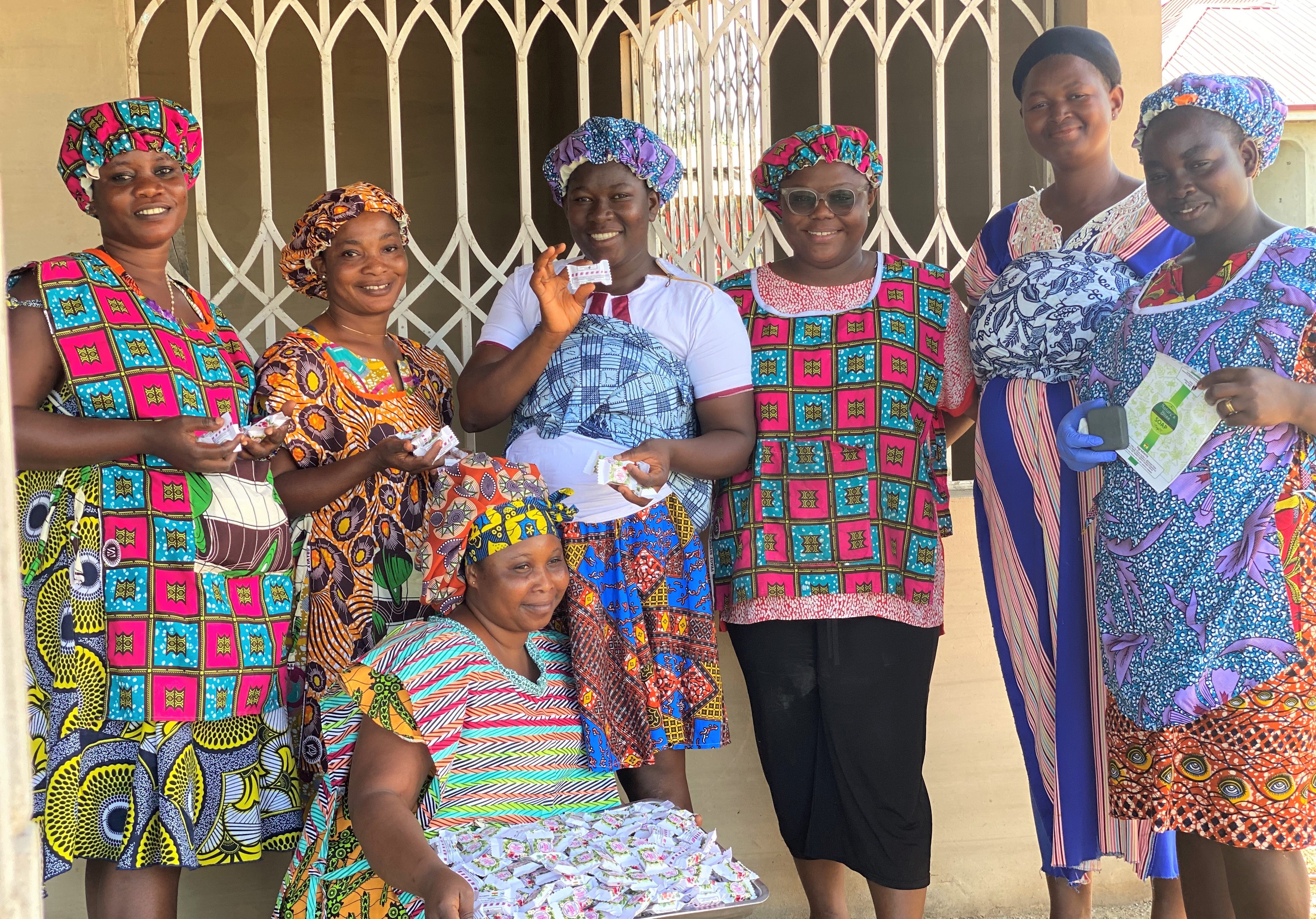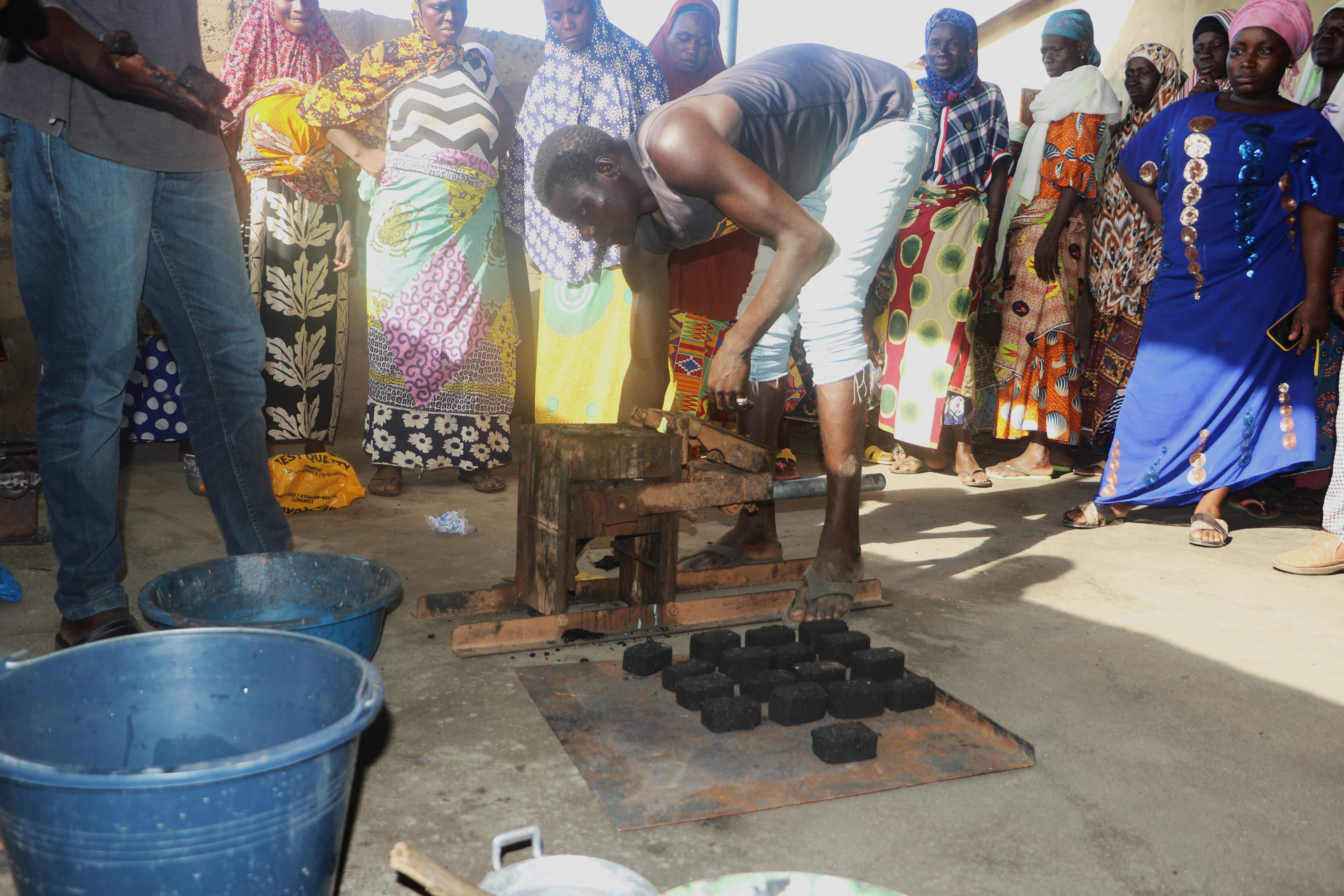Leveraging system & portfolio approaches for expanding the potential of the young and marginalized
UNDP Ghana launches new partnership with the Mastercard Foundation
November 29, 2023

Entrepreneurship is one route out of unemployment and Nana Yaa Manu Adjei (third from right) has built a flourishing business that employs more than 30 people.
During the COVID-19 pandemic Nana Yaa Manu Adjei returned to her family farm in Ghana.
Like many others, she needed to find a new way to make a living. Hotels and guesthouses in Ghana were looking for small soaps that they could not import during the pandemic, so she hit on the idea of making organic soap from the plants her family grew—cinnamon, bay leaf, lemon and nutmeg.
In common with many other African countries, Ghana has a huge youth population, representing about 38 percent of the population. Despite investments made by government, the private sector, civil society and development partners to create employment opportunities, significant problems remain and unemployment amongst young people is high. The situation is even more complex for marginalized groups. Young women, persons with disabilities and those from rural communities face unique obstacles. Entrepreneurship is one route out of unemployment. However about 74 percent of Ghanaian start-ups fail which is higher than the African average of about 50 percent.
Nana Yaa’s flourishing business, which now employs more than 30 people and has begun exporting, has bucked that trend, despite the obstacles she has encountered.
Women face unique challenges, particularly when it comes to farming and distilling your own essential oils. People are often averse to the idea. They think it’s impossible, it’s like hard labour, so don't expect a lady to perform it.Nana Yaa Manu Adjei, entrepreneur
The type of structural issues that Nana Yaa faces require a shift in a way we conceive development work, from fragmented and short-term fixes to more holistic, long term interventions and relationships that seek to change conditions for wellbeing and youth agency. This is where UNDP’s leveraging of system and portfolio approaches with agility of the Accelerator Lab network has helped trigger a new US$25.8 million partnership between the UNDP and the Mastercard Foundation.
Young Africa Innovates (YAI) is part of Mastercard’s Lean Innovation Fund. The primary objective is to develop a system to identify, test and expand youth-led solutions to economic growth. Its emphasis is on integrating young people and often under-represented groups into Africa’s innovation ecosystems.
UNDP Ghana works to empower communities, promote good governance, tackle climate change and promote sustainable economic growth. There has been progress but also setbacks. Inequalities and youth unemployment are persistent challenges and UNDP is exploring partnerships to support Ghana to find new opportunities. There is no doubt that the 21st century will continue to present more complex and interrelated challenges and opportunities.
YAI will tap into UNDP’s existing Accelerator Lab (AccLab) network. This brings in a range of new approaches to better understand underlying causes, gather expertise from different partners and to rapidly generate insights about what works and what doesn’t.
UNDP Ghana has developed a portfolio, supported through the Danish funded Innovation Facility, for tackling issues of employment with an understanding that the future of work is equally digitization, knowledge, and the creative economy as it is about legacies that keep many women and young people often unable to pursue opportunities.
Ghana’s Accelerator Lab, which was set up in 2019, is part of a network of 91 labs serving 115 countries. Funded by the governments of Qatar, the Federal Republic of Germany and UNDP’s partners, they work with people, governments, and the private sector to find grass roots solutions to complex challenges.

Molding briquettes from rice husks. UNDP's new partnership with the Mastercard Foundation will find entrepreneurs who may have low English literacy, no previous experience of accessing funds, or no formal business track record, as well as young women and people living with disabilities.
A recent UNDP report shows how many AccLabs are working with unusual partners, including start-ups, the informal sector, entrepreneurship hubs, grassroots innovators, social enterprises, the private-sector and think tanks. Combining the vast network of insights from non obvious partners has contributed to the YAI programme.
In Ghana UNDP will identify at least 5,000 young Ghanaians to work with. There will be a focus on those who are traditionally marginalized. This will include those who live in rural areas, who may have low English literacy, no previous experience of accessing funds, no formal track record of bank accounts and business plans, as well as young women and people living with disabilities.
Those who apply will receive early-stage support and coaching through dedicated call centres, workshops, and innovation scouts. The intent is not to funnel to and pick a small number of ‘winning’ solutions (a Silicon Valley approach) but instead to tackle structural barriers that stand in a way of growing more youth driven businesses and to weave a stronger social network among them that can thrive beyond UNDP and MasterCard Foundation’s support.
YAI provides an opportunity for UNDP Ghana to experiment with a portfolio approach to development programming building on previous experience.
UNDP Ghana will leverage programmatic, operational and subject matter expertise from across its portfolio. It will identify emerging trends in youth innovation quickly and iterate or correct the YAI model.
Our collective commitment envisions a world where no one is left behind, and where every young person's creativity, regardless of their background, plays a pivotal role in crafting innovative solutions for a brighter and more equitable tomorrow.UNDP Resident Representative in Ghana Angela Lusigi

 Locations
Locations



